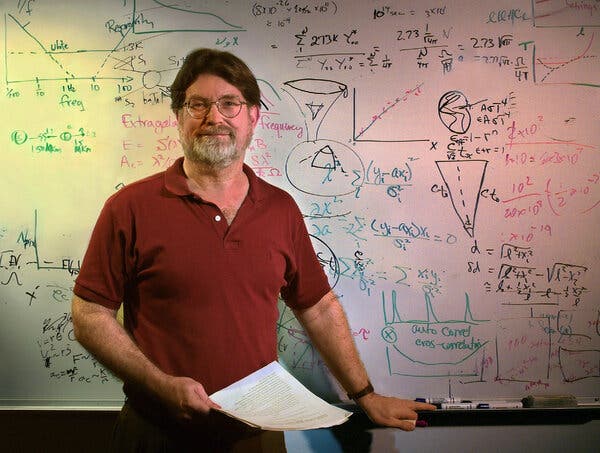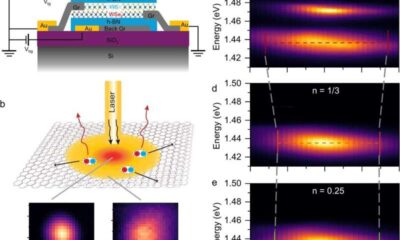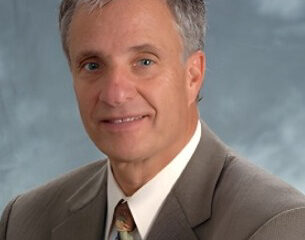Science
Nobel Laureate George F. Smoot, Pioneer of Cosmology, Dies at 80

George F. Smoot, a renowned American physicist and Nobel laureate, passed away on September 18, 2023, at his home in Paris, aged 80. His death, attributed to cardiac arrest, was confirmed by his sister Sharon Bowie. Dr. Smoot’s groundbreaking work in cosmology provided crucial insights into the origins of the universe, earning him acclaim as one of the most influential scientists of his time.
Dr. Smoot played a pivotal role in the Cosmic Background Explorer (COBE) project, which transformed our understanding of the universe’s creation. As a research scientist at the Lawrence Berkeley National Laboratory and the Space Sciences Laboratory at the University of California, Berkeley, he led a team that launched an instrument into space in 1989. This endeavor allowed scientists to capture a detailed image of the infant universe, revealing the temperature variations of the light leftover from the Big Bang.
The temperature fluctuations discovered by the COBE satellite provided compelling evidence of the primordial seeds from which galaxies and clusters formed. Dr. Smoot famously remarked, “If you’re religious, it’s like seeing God,” when announcing the findings in 1992, which garnered extensive media attention, including coverage from The New York Times. The theoretical physicist Stephen Hawking hailed the discovery as “the greatest discovery of the century, if not of all time.”
Transforming Cosmology Through Data
Dr. Smoot’s research was grounded in earlier discoveries made by physicists Arno A. Penzias and Robert W. Wilson, who identified the cosmic microwave background in 1964. This finding provided the first concrete evidence that the universe had a beginning. Prior to COBE, cosmology largely relied on theoretical speculation, but Dr. Smoot’s work helped establish it as a science rooted in precise measurements.
In recognition of their contributions, Dr. Smoot shared the 2006 Nobel Prize in Physics with John C. Mather, another leader of the COBE team. While he was widely respected for his intellect, Dr. Smoot was also a figure of controversy; some colleagues believed he received disproportionate credit for collaborative achievements. This tension came to light when a Berkeley Lab press release prior to the 1992 announcement was perceived to overlook the contributions of other team members and NASA.
In his 1993 book, “Wrinkles in Time: Witness to the Birth of the Universe,” co-authored with Keay Davidson, Dr. Smoot detailed the journey leading to the COBE discoveries. However, Dr. Mather later published his own account, “The Very First Light,” which differed on some aspects of the narrative.
A Lifelong Commitment to Science and Education
Born on February 20, 1945, in Yukon, Florida, George Fitzgerald Smoot III was raised in a family that valued education and scientific inquiry. His father, a World War II fighter pilot, worked as a hydrologist, while his mother was a science teacher and school principal. After attending the Massachusetts Institute of Technology, where he earned degrees in physics and mathematics, he obtained his Ph.D. in particle physics in 1970.
Dr. Smoot transitioned to cosmology while studying under Nobel laureate Luis Alvarez at Berkeley. He and physicist Richard Muller developed an instrument to measure temperature differences in the cosmic microwave background, which later contributed to understanding the Milky Way’s movement through space. Dr. Smoot’s vision for sending this instrument into space led to the creation of the COBE team, which launched a satellite equipped with three instruments.
The COBE mission confirmed the link between the cosmic microwave background and the Big Bang, measuring its temperature at approximately 2.7 kelvin, just above absolute zero. Dr. Smoot’s team identified temperature variations as minuscule as ten millionths of a degree, likening the challenge of detection to “listening for a whisper during a noisy beach party.”
The discoveries made by COBE not only validated the Big Bang theory but also provided substantial evidence for dark matter and the theory of cosmic inflation, which suggests a rapid expansion of the universe shortly after its inception. Subsequent missions, such as the Planck observatory, further refined COBE’s measurements, with Dr. Smoot contributing to the proposals for such initiatives.
In 1994, Dr. Smoot became a professor at Berkeley, where he founded the Berkeley Center for Cosmological Physics with a significant portion of his Nobel Prize money. His influence extended internationally, establishing cosmology institutes in countries including France and South Korea, and earning election to prestigious organizations like the National Academy of Sciences.
Later in his career, Dr. Smoot became increasingly involved in public outreach and science education. He initiated programs aimed at teaching high school educators and students about cosmology and taught an online course on gravity that attracted over 87,000 participants. He also made guest appearances on popular media, including the CBS sitcom “The Big Bang Theory,” and participated in the game show “Are You Smarter Than a Fifth Grader?” where he won $1 million, which he dedicated to scholarships for young scientists.
Dr. Smoot is survived by his partner, Nóra Csiszár, as well as his sister. His legacy in the field of cosmology and his dedication to education will continue to inspire future generations of scientists.
-

 Technology5 months ago
Technology5 months agoDiscover the Top 10 Calorie Counting Apps of 2025
-

 Technology3 weeks ago
Technology3 weeks agoOpenAI to Implement Age Verification for ChatGPT by December 2025
-

 Health3 months ago
Health3 months agoBella Hadid Shares Health Update After Treatment for Lyme Disease
-

 Health4 months ago
Health4 months agoAnalysts Project Stronger Growth for Apple’s iPhone 17 Lineup
-

 Health4 months ago
Health4 months agoErin Bates Shares Recovery Update Following Sepsis Complications
-

 Technology5 months ago
Technology5 months agoDiscover How to Reverse Image Search Using ChatGPT Effortlessly
-

 Technology3 months ago
Technology3 months agoElectric Moto Influencer Surronster Arrested in Tijuana
-

 Technology5 months ago
Technology5 months agoMeta Initiates $60B AI Data Center Expansion, Starting in Ohio
-

 Technology2 months ago
Technology2 months agoDiscover 2025’s Top GPUs for Exceptional 4K Gaming Performance
-

 Technology5 months ago
Technology5 months agoRecovering a Suspended TikTok Account: A Step-by-Step Guide
-

 Health5 months ago
Health5 months agoTested: Rab Firewall Mountain Jacket Survives Harsh Conditions
-

 Lifestyle5 months ago
Lifestyle5 months agoBelton Family Reunites After Daughter Survives Hill Country Floods





















